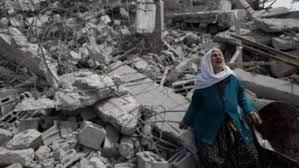West Bank Village Challenges Israel's Demolition of Homes

But within a few hours of work by a pair of Israeli bulldozers, all that was left was a mountain of rubble and twisted metal.
Like more than half of the homes in Ad Deirat-Rifaiyya -- a village of 1,800 residents on a windswept hillside in the southern West Bank -- the house was built on land owned by the villagers but without Israel's approval.
Left without a roof over their heads and unwilling to try building again, the family moved away to rented accommodation in a nearby town.
It is a scenario that plays out hundreds of times a year across most of the occupied West Bank, where Israel has made it all-but-impossible for Palestinians to obtain building permits.
The result is wide-scale "illegal" construction, which is then demolished by Israel in a policy that has drawn widespread condemnation.
The question of Israel's iron grip on all planning matters in what is known as Area C -- which covers more than 60 percent of the occupied West Bank -- is now being debated by the Israeli Supreme Court, AFP reported.
In a landmark appeal, Ad-Deirat village, NGO Rabbis for Human Rights and three other organizations are demanding the state end its discriminatory housing policies and return local planning rights to Palestinians.
The appeal also raises the question of forced displacement of local Palestinians as a result of planning failure and the practice of house demolitions -- both of which are banned under international law.
"Planning is not seen as a right, it is seen as something... that the Israeli government can bestow or withdraw," says Arik Ascherman, president of Rabbis for Human Rights.
UN figures show there are 298,000 Palestinians living in Area C.
Area C covers 360,000 hectares (890,000 acres) but less than one percent of it is designated for Palestinian development, compared to 70 percent for settlements, the UN says.
Until the 1967 Six Day War, the Palestinians had their own planning committees, but these were disbanded by military order in 1971, while special bodies were set up for settlements.
The result is a two-tier system -- a civil and consultative planning system for settlers and a military system without representation for Palestinians.
"The result is an ongoing and deepening planning failure and the massive destruction of Palestinian homes in Area C," urban planning expert Professor Ghassan Khamaiseh wrote in an affidavit to the court.
Last year Israel demolished 601 Palestinian-owned structures, displacing 1,215 people.
The UN said it was the highest annual number of people affected by the policy since it began keeping records in 2008.
In Ad-Deirat, where most houses lack a permit, the threat of demolition hangs over everyone.
"It is a very hard feeling because every day, you see jeeps passing, you think they're coming to demolish your house," says Mohammed al-Umur, a 59-year-old farmer.
"This is both a psychological and a financial war with no limit. The feeling is indescribable," says Umur, who has plowed all his income and that of his sons into defending and then rebuilding four family homes that were razed.
"Everyone living here who is over 45 has had at least one house demolished -- some of them have been through it two, three or four times," says Mohammed al-Adra, a taxi driver.
"The aim of this is to make us leave," he says.



